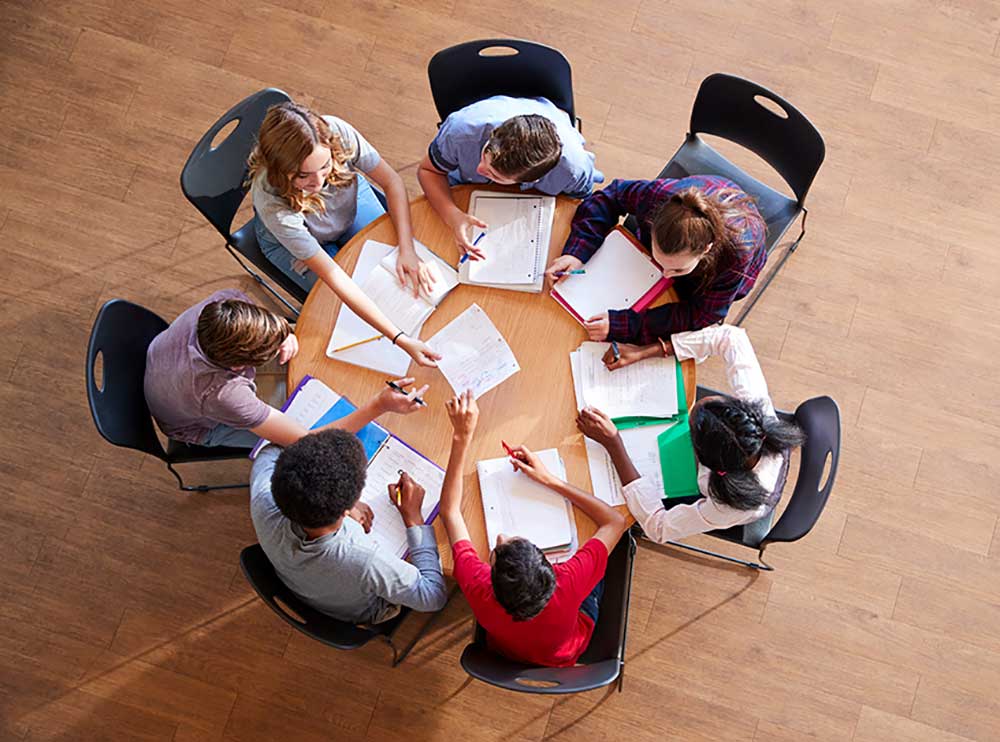
Have you ever have had a night stay over at your friend’s place and planned for studies? We know it mostly ends up in binge watching Netflix or gossiping. But then science has time and again proved that group studies can do wonders if utilized effectively. Else, it is merely a waste of time.
Teaching and learning in education are important and the methods to fulfill the objectives are changing. Active learning has become an integral part of the modern age curriculum. As we require, job embedded practice for schools and to make changes on teaching strategies and learner’s achievement impactful, the concept of group study provides a forum for different perspectives and ideas.
What is a Group Study?
According to Merriam Webster Dictionary, learning can be defined as the activity or process of gaining knowledge or skill by studying, practicing, being taught, or experiencing something, the activity of someone who learns, and knowledge or skills that gained from learning.
Studying with a group is a great way to lighten up study pattern and a way to grabbing knowledge. Group Study involves a small group of people who regularly meet to discuss and share the resources, knowledge or notes prepared by them which makes learning enjoyable.
Need for group study:
- To have an exposure to different ways of thinking and learning, to develop and discuss ideas and implementation of those conveniently
- To Provide support and motivation for learning
- To Increase self-confidence group study plays a vital role
- To promotes diversity and Helps to develop critical thinking and problem-solving skills.
- Group study enhances students test performance, stimulates interest and helps in learning team work.
Advantages of group study over Self study
Different students have different studying approaches and techniques which depend on their preferences, character, nature, and availability of resources. Meeting regularly with your group reduces procrastination as there is healthy competition while they prepare for important exams and assignments.
- Groups have more information than a single individual and greater well of resources to tap and more information.
- Groups stimulate creativity and innovative techniques. People remember group discussions better especially in the debate form and have the tendency to learn more and retain it longer than when the same material is presented in other formats.
- It provides emotional and physical support.
- It encourages members to build a strong communication skill which also helps in refining and understanding of the material.
- Group work allows people to gain a more accurate picture of how others see them. The feedback that they receive may help them better evaluate their interpersonal behavior.
Tips to make group study an effective one:
- Be punctual (I.e.) arrive on the time and be regular.
- Make sure that members of the group are able to communicate frankly and liberally.
- Identify the goals of the group members and plan accordingly.
- Pick a good study space and make a pleasant environment. Decide those things that can help to yield satisfaction.
- Mentally be prepared to work and revise, review notes, complete assigned readings regularly and be willing to share ideas, improve methods, provide and seek suggestions,
- Don’t hesitate to ask questions and clarify the questions time by time.
- Always be an active participant by being an active listener. Share strategies and ideas that could be helpful for the team mates.
- Exchange contents, information, ideas, and tasks and be helpful to everyone. Don’t postpone or split up the work. Prepare individually.
- Understand that Different people have different abilities and personalities in the group, which can inhibit success.
- Agree on what is acceptable or appropriate in terms of interactions and participation and keep the point of view whenever needed.
- Stay focused and make sure that sessions are not be allowed to turn into an embarrassing forum for gossip or complaints.
- Make feel comfortable, safe, and value other team members. Be polite and patient and try to avoid arguments as much as possible.
- Avoid aggressive, critical responses that might inhibit participation or degeneration of the group. Don’t interrupt between the conversations, listen carefully.
- Don't monopolize the sessions. Recognize and resolve conflicts within the group quickly and handle with diplomacy.
- Be cooperative, not competitive—make use of each opportunity and utilize it wisely. Friends know our interests, abilities, weakness, and strengths. Try to collect your weaknesses and try to convert to your strength. Periodically assess the works.
- Make necessary changes need to be made. Motivate and encourage fellow members. Always Welcome new ideas and help to maintain interest unity. Wrap up and summaries the necessary ideas and suggestions.
- Make use of technology effectively and available to all. Think different perspectives on the subject and understand it better.
- Defend your ideas, perspectives, and views and find solutions that suit others whenever necessary. Organize the complete study course.
